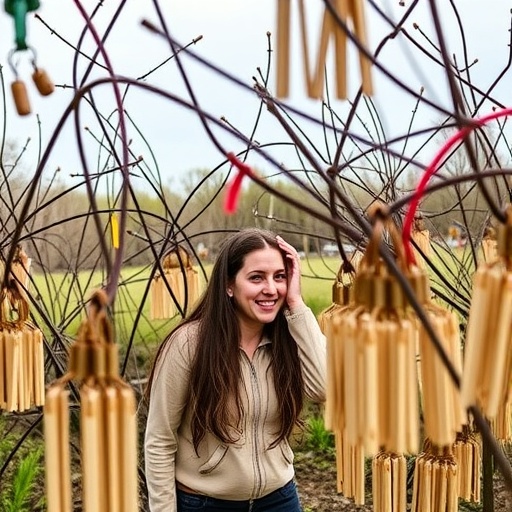
In a groundbreaking study published in Health Research Policy and Systems, a trio of researchers delves into the intricate realm of co-production within health and welfare systems. The research, led by A. Nordin, S. Kjellström, and A.C. Andersson, takes a fresh approach by focusing on the perspectives of new researchers. This innovative exploration is not just an academic exercise; it aims to demystify the concept of programme theories, which have long been considered crucial yet convoluted frameworks within the health sector.
At the heart of this investigation lies the understanding that health and welfare systems are complex and multifaceted. Co-production involves collaboration between service users and providers, which can enhance outcomes by incorporating diverse insights and shared expertise. However, the processes involved are often opaque, leading to misunderstandings and misapplications. The authors argue that clarifying these programme theories is essential for fostering effective co-production models.
The methodology of this interview study involves engaging with newly appointed researchers in the health sector. This demographic offers a unique vantage point, as they bring fresh perspectives to well-trodden issues. By utilizing semi-structured interviews, the researchers gathered insights into how these new entrants perceive and interpret co-production and its underlying programme theories. This qualitative approach allows for a depth of understanding that quantitative methods might overlook.
Among the key findings are the participantsâ shared experiences of confusion regarding existing frameworks. New researchers reported encountering a plethora of disparate theories that sometimes contradict each other or lack clear applicability to their specific contexts. This lack of clarity not only hampers their research efforts but also limits their ability to engage meaningfully with practitioners on the ground. The study emphasizes the need for a more coherent framework that delineates the principles and practices of co-production in simpler terms.
The interviews revealed that despite the confusion, participants demonstrated a strong desire to engage in co-production processes. They recognized the potential benefits of collaborating with service users to develop solutions that genuinely meet community needs. However, the overwhelming complexity of existing programme theories often presents a barrier to entry. By advocating for clearer communication and simplified models, the authors hope to inspire a new generation of researchers to embrace co-production in their work.
Furthermore, the study highlights the significance of systems perspectives in understanding health and welfare dynamics. New researchers often approach problems from a systems standpoint, recognizing interconnections between various components of health delivery. This holistic view enables them to appreciate the ripple effects of co-production on the overall system, from policy-making to frontline service delivery. However, without adequate training and resources, these new perspectives can be lost or underutilized.
The implications of this research extend beyond academia and into practical applications within health and welfare settings. Policymakers and administrators are encouraged to take note of the insights presented by the participants. In aligning policy frameworks with the realities faced by new researchers, the possibility of cultivating more robust co-production initiatives becomes attainable. This connection between theory and practice is vital for the evolution of effective health services that cater to diverse populations.
Moreover, the study poses critical questions about the roles and responsibilities of various stakeholders within co-production frameworks. As service users become more involved in the design and delivery of health services, their voices must be amplified rather than marginalized. The authors call for a shift in power dynamics that values user input and expertise as equally crucial to that of traditional health professionals.
In discussing programme theories, the researchers also touch upon the role of technology in facilitating co-production. Digital platforms and communication tools have the potential to bridge gaps between researchers, service providers, and users. However, reliance on technology also brings challenges, such as accessibility and the digital divide, which must be addressed to ensure equitable participation in co-production efforts.
This research opens up new avenues for future investigation. It serves as a timely reminder of the necessity to continually adapt and refine our understanding of co-production in health and welfare. As the landscape of healthcare evolves, so too must the frameworks we use to guide collaboration between stakeholders. The authors advocate for ongoing dialogue and research that engages a wider array of voices, particularly those of marginalized communities.
The potential for this study to catalyze change within health research and practice is immense. By demystifying programme theories and providing new researchers with a clearer framework, the authors pave the way for enhanced collaboration and innovation. The call for simpler, more user-friendly models of co-production resonates not only within academic circles but also with practitioners who seek to implement these theories in real-world settings.
In conclusion, Nordin, Kjellström, and Anderssonâs research provides a vital contribution to the ongoing discourse on co-production in health and welfare. Their findings underscore the importance of clarity, collaboration, and continual learning within this multifaceted arena. As future researchers and practitioners engage with these insights, the hope is that co-production will become an integral part of health delivery, ultimately leading to improved outcomes for service users and providers alike.
The exploration into co-production by these researchers not only sheds light on current challenges but also inspires a collaborative future in health welfare research. As we embark on this journey, it is imperative to heed their call for simplification, engagement, and inclusivity. The role of new researchers, equipped with fresh insights and a systems perspective, will be pivotal in shaping the next phase of health and welfare evolution.
Subject of Research: Co-production in health and welfare systems
Article Title: Demystifying programme theories of co-production in health and welfare: An interview study on new researchersâ systems perspectives
Article References:
Nordin, A., Kjellström, S. & Andersson, AC. Demystifying programme theories of co-production in health and welfare: An interview study on new researchersâ systems perspectives. Health Res Policy Sys 23, 90 (2025). https://doi.org/10.1186/s12961-025-01368-y
Image Credits: AI Generated
DOI: 10.1186/s12961-025-01368-y
Keywords: Co-production, health systems, programme theories, new researchers, systems perspectives
Tags: co-production in health systemscollaboration in health servicescomplexities of welfare systemsdemystifying health frameworksenhancing health outcomeshealth research methodologiesinsights from novice researchersinterview study in health researchnew researchers perspectivesprogramme theories in welfarequalitative study on co-productionunderstanding co-production models




